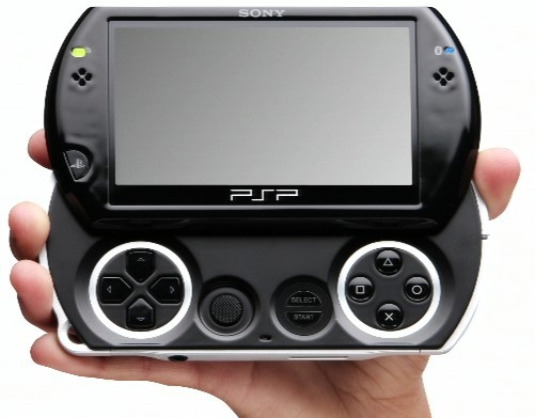 I will now attempt to navigate a PSP Go hands-on article without using any puns related to locomotion.
I will now attempt to navigate a PSP Go hands-on article without using any puns related to locomotion.
Let’s start with the specs, which were known even before Sony officially announced the new model. It’s 40 percent lighter and 50 percent smaller than the existing PSP-3000, the company says. A 16 GB flash drive is on board, and there’s a Memory Stick Micro slot for expansion up to 16 GB. There’s no UMD drive, so games and videos are downloaded directly onto the device.
Maybe it’s the lightness, but the PSP Go miraculously works despite its small size and cramped layout. The controls slide down from the bottom half of the device, so holding it is decidedly different than grasping the sides of the PSP-3000, and a bit awkward at first.
Still, the Go rests comfortably in the hands. Keep in mind that the ones I tried were firmly shackled to a kiosk (seen below), with a metal guard in place to keep the controls open, so I couldn’t hold the device in different ways or get a true sense of the weight. Even so, a nearby PSP-3000 was markedly heavier.
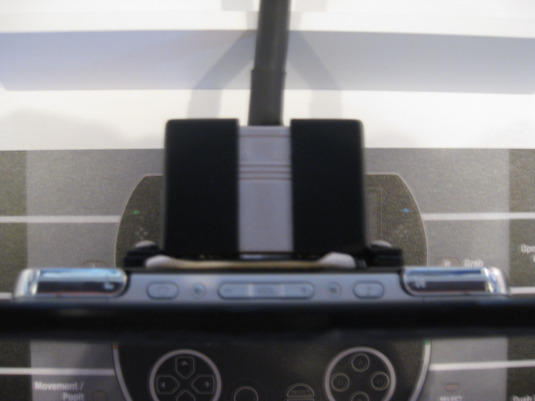
The analog pad, which is now depressed into the handheld’s surface, is easy to reach, even if the thumb irritation from using it hasn’t gone away since the last model. Face buttons can be pressed with accuracy, and triggering the two shoulder buttons required no extra effort despite resting on different parts of my fingers.
I played LittleBigPlanet and Jak and Daxter: The Lost Frontier during my time with the Go. The console has a smaller screen than the PSP-3000 — 3.8 inches compared to 4.3 inches, respectively — but I didn’t have any trouble discerning what was happening.
As for software, the PSP Go uses the same media bar as the PSP-3000. Kotaku reports that Sony is working on a solution for PSP-3000 owners to transfer their UMD games and wants to have something in place before launch.
Like any handheld, your mileage may vary in the comfort department. Most of what I heard from other reporters is positive, but gripes with the design are inevitable; it’s all a matter of taste. If the $250 price tag doesn’t scare you, I’d still recommend trying the device instead of impulse buying on October 1.

 If the banner covering the top of the Los Angeles Convention Center is any indication, Brütal Legend is a big deal. For Activision, which once held the game’s publishing rights, its the subject of a lawsuit.
If the banner covering the top of the Los Angeles Convention Center is any indication, Brütal Legend is a big deal. For Activision, which once held the game’s publishing rights, its the subject of a lawsuit.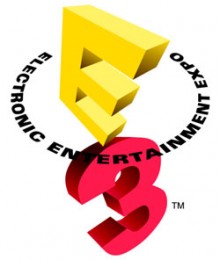 Press conferences are exciting and all, but E3 is no good if you can’t indulge in all the games everyone’s waiting to play — and all the sensory overload that comes with them.
Press conferences are exciting and all, but E3 is no good if you can’t indulge in all the games everyone’s waiting to play — and all the sensory overload that comes with them.
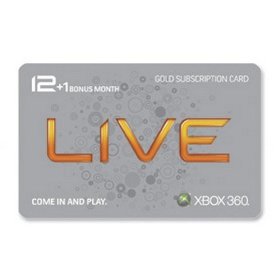 I’m no fan of using Microsoft Points to purchase Xbox Live content. The idea that you can only purchase preset amounts of points, which are always more than what you actually need, discourages me from shopping the console marketplace altogether.
I’m no fan of using Microsoft Points to purchase Xbox Live content. The idea that you can only purchase preset amounts of points, which are always more than what you actually need, discourages me from shopping the console marketplace altogether.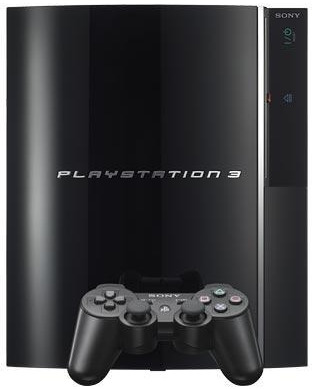 In my mind, I was readying a trend piece on how this year’s E3 was all about broad appeal from the big three console makers. That plan was scrapped after Sony’s press conference, which was tailor-made for the college male demographic.
In my mind, I was readying a trend piece on how this year’s E3 was all about broad appeal from the big three console makers. That plan was scrapped after Sony’s press conference, which was tailor-made for the college male demographic. Nintendo didn’t look like a trendsetter at its E3 press event today. Instead, we got an earful of cockiness.
Nintendo didn’t look like a trendsetter at its E3 press event today. Instead, we got an earful of cockiness.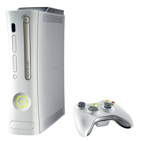 If
If